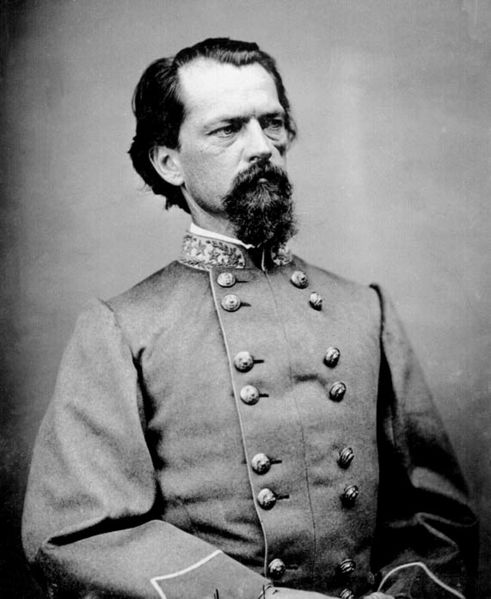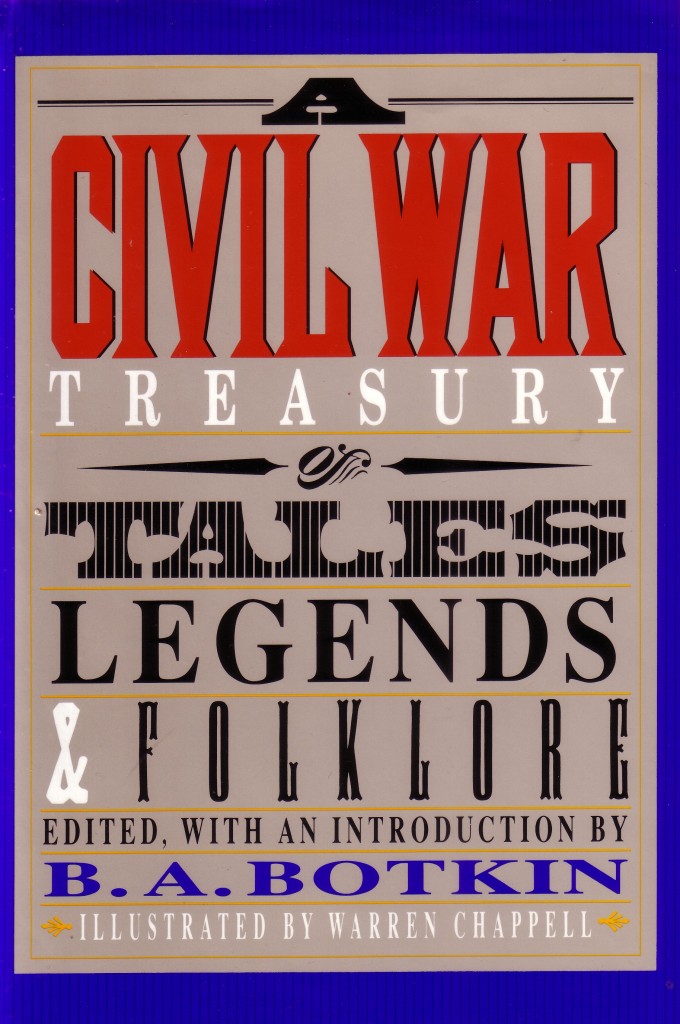Naked Man Visits Rebs on Rapidan
Posted By Norman Gasbarro on January 27, 2011
In locating interesting stories about the Civil War, often the best ones are found in obvious places. The one told below was located in an anthology entitled Civil War Treasury of Tales, Legends & Folklore, edited by B. A. Botkin, and published in 1960. It comes from a Confederate Gen. John Brown Gordon (1832-1904), and was first printed in the Southern Historical Society Papers in 1882. It tells of a visitor to the Confederate camp on the Rapidan River in the late summer of 1863.
Across the river from the Confederates was the camp of the 104th Pennsylvania Infantry. In checking the list of Civil War veterans who have been identified for this project, only one man is identified as a member of the 104th Pennsylvania Infantry. That man is Josiah Witmer. Not much is known about Josiah, except that he claimed to have joined the 104th Pennsylvania Infantry, Company H as a Private on 25 March 1862, although other records have him joining as late as September 1863. He is also found in the 1890 Veterans Census, living in Joliett, Schuylkill County, Pennsylvania. Josiah Witmer is probably not the man described in the story told below – but it is possible that if the incident occurred, he would have known about it.
The story is told in the first person by Gen. John B. Gordon and is condensed from the original:
We were on the Rapidan River… a little stream about one hundred feet wide. Gen. Lee [ordered me] to break up the communication between our pickets and the enemy’s.
They had got to trading with each other in newspapers, tobacco, lies, and whatever could vary the monotony of picket life. They would not shoot at each other…. So… one morning [I] rode the whole length of the picket-line, and just as I came to certain point I saw that there was confusion and surprise, as if I had not been expected.
“What is the matter, men, here?” I asked.
“Nothing, General, nothing is here.”
“You must tell me the truth,” said I; “I am not welcome, I see, and there must be some reason for it….”
“There has been nobody here, General. We were not expecting you, that is all.”
I turned to two or three of the soldiers and said: “Beat down the bushes here.” They had to obey, and there suddenly rose up out of the weeds a man as stark naked as he had come into the world. “Who are you,” asked I.
“I am from over yonder, General.”
“Over yonder – where?”
He pointed to the other side of the river.
“What regiment do you belong to?”
“The One Hundred-fourth Pennsylvania, General.”
“What are you doing in my camp?”
“Why, I thought I would just come over and see the boys.”
“See the boys- what boys? Do you mean to say you have entered my camp except as a prisoner? Now I’m going to do this with you. I am going to have you marched to Libby Prison just as you are, without a rag of clothes on you!”
“Why, General, you wouldn’t do that just because I came over to see the boys! I didn’t mean any harm! I felt lonesome over there and wanted to talk to the boys a little. That is all.”
“Never mind sir; you march from this spot clothed as you are, to Libby Prison!”
“General,” said the man, “I had rather you would order me to be shot right here.”
“No sir, you go to Libby!”
Then several of my soldiers spoke up: “General, don’t be too hard on him, he’s a pretty good fellow! He didn’t mean any harm; he just wanted to talk with us.”
“This business must be broken up,”said I “- mixing on the picket-line.”
It had not been in my heart, however, to arrest the man from the beginning, I only wanted to scare him, and he did beg hard. “I’ll tell you what I will do with you this time,” for I saw that he was a brave, good-humored fellow. “If you will promise me that neither you nor any of your men shall ever come into my lines again except as prisoners, I’ll let you go.”
“God bless you, General!” said the man, and without any more adieu he just leaped into that stream and came up on the other side, and took to the woods.
In considering the reputation of Gen. John B. Gordon, it is very possible that this is just another tall tale he told in the post-war period. Gordon was known for his stories. During the war, he was one of Robert E. Lee’s most trusted generals. After the war he was a strong opponent of Reconstruction and some believe that he was the titular head of the Ku Klux Klan in Georgia in the 1860s. By 1873 he began serving as the U.S. Senator from Georgia for one term and again, another term from 1891-1897. In the interim, he served as Governor of Georgia from 1886-1890.
During the war, Lee described him as “audacious” and although he had no formal military training, he led his men into battle as if he knew what he was doing. Gordon had a propensity for getting wounded and for fighting on despite the wounds. Many stories exist about incidents involving Gordon getting wounded. One time, at the Third Battle of Winchester, Gordon was wounded in the head, and while he was attempting to regroup his men to attack the Union forces, his wife Fanny (who accompanied him throughout the war) rushed into the fighting and rallied the men to turn and fight. She apparently thought that the blood streaming down her husband’s head would affect his vision. It was her way of helping, given the situation.
During the campaign for Gettysburg, Gen. Gordon’s men reached the farthest east on the Susquehanna River that the Confederates would go –to Wrightsville – and is credited for saving the town from fire after retreating Unionists set fire to a bridge to prevent Gordon’s advance, but the fire accidentally spread to the town. Gordon ordered a bucket brigade to save the town.
In 1903, Gen. Gordon published his account of his Confederate service in Reminiscences of the Civil War. Some excerpts are found at The War Times Journal. The story of Gordon’s wife Fanny rushing into the midst of the battle is from the Wikipedia article on Gen. Gordon as is the story about the bucket brigade to save the town of Wrightsville, Pennsylvania. Other interesting stories of the Civil War are found in the book previously mentioned in which the “naked man” story was found, Civil War Treasury of Tales, Legends & Folklore.
 ;
;




Comments